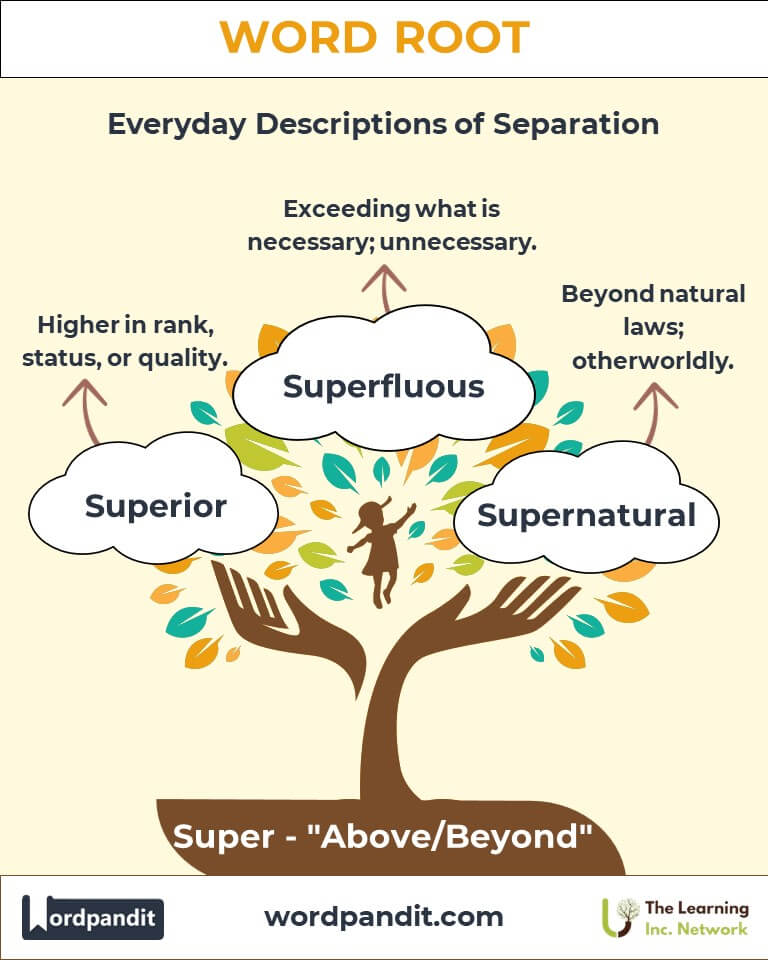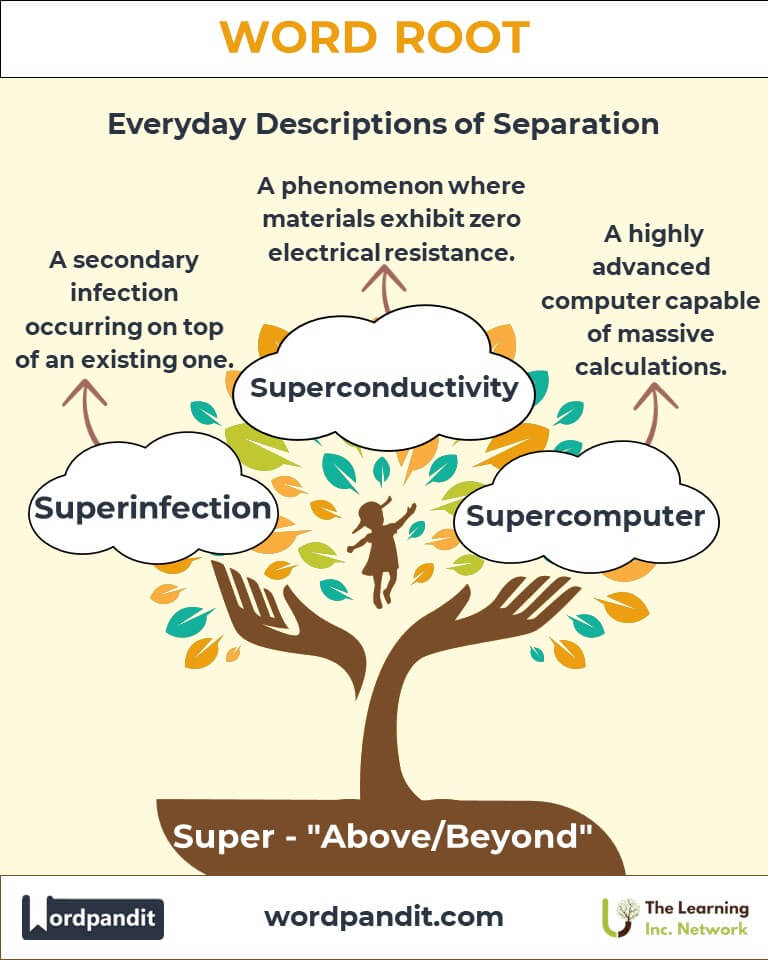Super: The Root of Supremacy and Transcendence in Language
Discover the power and significance of the word root "Super," derived from Latin, meaning "above" or "beyond." From common words like "superior" to specialized terms like "supernatural," this root has infused our vocabulary with concepts of excellence, elevation, and extraordinariness. Let’s explore how "Super" elevates language across disciplines.

Table of Contents
- Introduction: The Elevating Essence of "Super"
- Etymology and Historical Journey
- Mnemonic: Unlocking the Power of "Super"
- Common "Super"-Related Terms
- "Super" Through Time
- "Super" in Specialized Fields
- Illustrative Story: "Super" in Action
- Cultural Significance of the "Super" Root
- The "Super" Family Tree
- FAQs About the "Super" Word Root
- Test Your Knowledge: "Super" Word Root Quiz
- Conclusion: The Living Legacy of "Super"
1. Introduction: The Elevating Essence of "Super"
When you hear "super," what comes to mind? Perhaps "superior," "superstar," or even "superhero"? The root "Super," pronounced soo-per, originates from Latin, meaning "above" or "beyond." This root forms the foundation of countless words that evoke concepts of supremacy, transcendence, or extraordinary nature. Whether in everyday usage or specialized contexts, "Super" propels language to greater heights.

2. Etymology and Historical Journey
The root "Super" comes from the Latin word super, which translates to "above" or "over." In classical Latin, "Super" was used both literally (e.g., physical positioning) and metaphorically (e.g., superiority or excellence). It entered the English language through Old French during the Norman Conquest, eventually becoming a staple prefix in words emphasizing heightened states or qualities.
Historical milestones include:
- The adoption of "superior" in the 14th century to denote excellence.
- The evolution of "supernatural" in the Middle Ages to describe phenomena beyond natural laws.
- The rise of modern terms like "supercharge" in the 20th century, reflecting technological advancements.
3. Mnemonic: Unlocking the Power of "Super"
Imagine a superhero soaring above the clouds, embodying greatness and going beyond human limits.
Mnemonic Device:
"SUPER soars above and beyond, making everything extraordinary!"
4. Common "Super"-Related Terms
- Superior (soo-peer-ee-or)
Definition: Higher in rank, status, or quality.
Example: "The superior design of the new car makes it stand out." - Supernatural (soo-per-nach-er-uhl)
Definition: Beyond natural laws; otherworldly.
Example: "The film explores supernatural phenomena like ghosts and telekinesis." - Superimpose (soo-per-im-pohz)
Definition: To place one thing over another.
Example: "The artist superimposed an image of the city onto a starry background." - Superfluous (soo-per-floo-uhs)
Definition: Exceeding what is necessary; unnecessary.
Example: "Avoid superfluous details in your report to keep it concise." - Supercharge (soo-per-chahrj)
Definition: To enhance or boost significantly.
Example: "This software update will supercharge your device’s performance." - Superstructure (soo-per-struhk-cher)
Definition: A structure built above something else.
Example: "The superstructure of the bridge is both functional and visually striking."
5. "Super" Through Time
- Superb (16th century): Initially meant "majestic" or "magnificent," now denotes excellence.
- Superpower (20th century): Evolved from describing supernatural abilities to denoting powerful nations.
- Supersede (Historical): Originally meaning "to sit above," it now signifies replacing or taking precedence.
6. "Super" in Specialized Fields
Medicine
Superinfection: A secondary infection occurring on top of an existing one.
Example: "Antibiotic misuse can lead to a dangerous superinfection."
Technology
Supercomputer: A highly advanced computer capable of massive calculations.
Example: "Supercomputers play a vital role in climate modeling."
Physics
Superconductivity: A phenomenon where materials exhibit zero electrical resistance.
Example: "Superconductivity has applications in magnetic levitation trains."
Architecture
Superstructure: The part of a building above its foundation.
Example: "The superstructure of the skyscraper is made of reinforced steel."
7. Illustrative Story: "Super" in Action
Maya, an architect, was tasked with designing a superstructure for a new urban center. Using supercharged tools and her superior skills, she created a plan that incorporated superfluous luxury elements while remaining eco-friendly. The design was so revolutionary that it was featured in a documentary on supernatural innovations in architecture. Maya’s ability to go above and beyond left a lasting legacy.
8. Cultural Significance of the "Super" Root
The root "Super" holds cultural prominence as a symbol of aspiration and excellence. From superheroes inspiring courage to superstitions reflecting beliefs in forces beyond our understanding, "Super" has shaped how we perceive greatness. It is deeply ingrained in literature, media, and even everyday expressions like "superb job!"

9. The "Super" Family Tree
- Sur (French, from Latin super): Means "over" or "above."
- Surcharge: An additional charge.
- Hyper (Greek): Means "over" or "excessive."
- Hyperactive: Excessively active.
- Sub (Latin): Means "under" (antonym of Super).
- Submarine: An underwater vessel.

10. FAQs About " Super "
Q: What does the root "Super" mean?
A: The root "Super" means "above" or "beyond," originating from Latin. It is often used to indicate a higher position, quality, or extraordinary nature, as seen in words like "superior" (higher quality) or "supernatural" (beyond natural laws).
Q: How does "Super" differ from "Hyper"?
A: Both "Super" and "Hyper" imply something beyond the norm, but they differ in nuance. "Super" generally denotes superiority or transcendence (e.g., "superior" or "superstructure"), while "Hyper" emphasizes excessiveness or overactivity (e.g., "hyperactive" or "hypertension").
Q: What does "Supernatural" mean, and how is it different from "Superhuman"?
A: "Supernatural" refers to phenomena or events that defy natural laws, such as ghosts or miracles. In contrast, "Superhuman" describes abilities or qualities exceeding normal human capacity, such as exceptional strength or intelligence.
Q: How is "Super" used in scientific contexts?
A: "Super" appears in many scientific terms. For instance, "superconductor" refers to a material that conducts electricity without resistance, while "superstructure" describes the part of a building above its foundation. These terms emphasize extraordinary or superior qualities in their respective fields.
Q: Can "Super" be used in negative contexts?
A: While "Super" often conveys positivity or excellence, it can also imply unnecessary excess or redundancy, as in "superfluous," which means excessive or unnecessary.
11. Test Your Knowledge: " Super " Mastery Quiz
1. What does the root "Super" mean?
2. Which word means "unnecessary or excessive"?
3. What is a "Superstructure"?
4. What does "Supernatural" describe?
5. Which term denotes a secondary infection?
12. Conclusion: The Living Legacy of "Super"
The root "Super" is a testament to humanity’s desire for excellence, transcendence, and innovation. From empowering vocabulary in science and technology to enriching cultural expressions, "Super" continues to elevate our language and aspirations. Embrace its legacy and let "Super" inspire you to go above and beyond!














